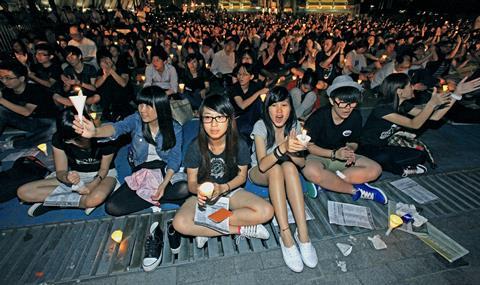With tensions escalating in Hong Kong, StrategicRISK takes a closer look at the issue, advising risk managers to ’review and update their business contingency plans and crisis response protocols now’
Asia-Pacific risk managers have been warned to expect an increasing number of political protests in the wake of events in Hong Kong, with an “unprecedented level” of civil unrest worldwide.
Alex Rosati, claims leader for Hong Kong and Macau at insurance broking and risk management firm Marsh, says large-scale protests have become more common, helped by the advent of social media.
Rosati adds: “We are seeing an unprecedented level of such events worldwide. The events are due to any number of factors, depending on the jurisdiction, and are also made more possible logistically due to social and other media, and the internet generally. Even in a relatively stable political environment, they are becoming more prevalent.”

Rosati says risk managers should plan ahead to guard against potential disruption. He believes risk managers should be “prepared from a risk mitigation and safety perspective as well as having a robust insurance program in place”.
Marsh is advising its clients to review and update their business contingency plans and crisis response protocols following several months of unrest in Hong Kong.
The protests, which began in late March due to proposed changes to extradition law, have escalated over the past few weeks, as protesters attempt to force democratic reforms.
Last week, protesters shut down Hong Kong’s international airport, leading to hundreds of flight cancellations and widespread business disruption.
The Hong Kong situation could escalate further as the Chinese government ponders an intervention. China has hardened its rhetoric and begun massing troops near the Hong Kong border.
Analysts predict political risk could be on the increase in Asia. Coface’s Political Risk report, published last September, found that Asia had a political risk ranking of 45%, above the global average of 35%. Coface said rising political fragilities, “aggravated by a proliferation of less democratic styles of governance” were key risks in the region.
Coface’s report also suggested growing access to information may increase political risk across Asia: “Economies in South and Southeast Asia are characterised by large, young, urban classes with rising access to education and information. This means that their populations have access to a growing number of instruments that enable them to express their dissatisfaction with existing pressures, explaining higher overall levels of political risk.”
Following the ongoing Hong Kong protests, Marsh advises clients across the region to update “specific protocols that relate to any protest, demonstration or other disturbance”.
Marsh suggests crisis response protocols including measures to protect patrons and employees from harm, measures to protect individuals from damage and fire, and protocols for engaging with first responders.
The firm says a working emergency communication system is also essential, ensuring employees can communicate quickly during dangerous situations.
Marsh also believes risk managers should also review their insurance coverage with the threat of further unrest.
Rosati adds: “Marsh highly recommends that risk managers review their insurance programs to ensure that coverage is adequate, and has pointed out that policy forms in use in the market, in many different classes of insurance, have different terms, conditions and exclusions which may affect coverage.”
Risk management expert Steve Tunstall, a former head of risk and insurance for Hong Kong flag carrier Cathay Pacific Airways, says having a well-trained crisis management team is vital in the current environment.
“Having business continuity plans is one thing, to make sure the team knows what their roles are, and how to handle disruptions to both the customer experience and staff logistics. But equally important is to have an alert and well-trained crisis management team with the authority to think independently and make on the spot decisions correctly.”
Tunstall says Hong Kong-based businesses should focus on short term safety and security matters, but argues those based outside of the country should not rush to judgement about the nation’s long-term political risk.
“For those outside Hong Kong, there are certainly short term disruption concerns, but it’s unclear what the long term impacts are likely to be. Strategic decision making shouldn’t be rushed on the basis of short term risk.
“The demise of Hong Kong has been predicted repeatedly in the past, and each time, the city has survived, and indeed thrived. Hong Kong continues to play a role as a unique entry port to China as a whole. I would not bet against the city reinventing itself to learn and evolve from the current crisis in the longer term,” Tunstall adds.




















No comments yet